May 19, 2025 | 13:57 GMT +7
May 19, 2025 | 13:57 GMT +7
Hotline: 0913.378.918
May 19, 2025 | 13:57 GMT +7
Hotline: 0913.378.918
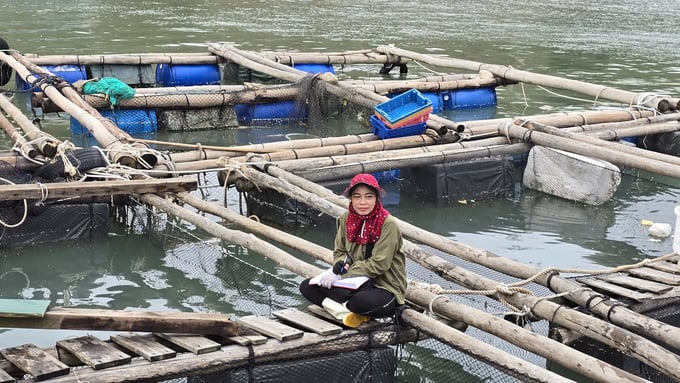
In storm No. 3, Ms. Vinh on Thang Loi Island (Van Don District) suffered nearly 5 billion VND in damage but remained optimistic, "where there's hustle, there's muscle". Photo: Vu Cuong.
The estimated total damage in Quang Ninh province following Typhoon No. 3 was approximately 24,000 billion VND, with 2,637 aquaculture facilities affected, leading up in losses of nearly 3,700 billion VND.
In Quang Ninh, aquaculture farmers have a common circumstance in which those who farmed more suffered greater losses, while those who farmed less lost less. The storm entirely destroyed the fish cages of some families, which were worth nearly a hundred billion VND. Tragically, some individuals lost their lives at sea, including Mr. Long Van Quang in Van Don.
Mr. Tran Van Thien, a large-scale oyster farmer in Van Don, shared at a meeting between Quang Ninh's provincial chairman, Cao Tuong Huy, and Van Don's sea farmers, where they discussed plans to support people affected by the storm, "Although authorities and the media warned about the storm well in advance, no one expected it to be so intense, turning into a disaster. The storm was unexpectedly intense," he said.
"Mr. Long Van Quang was unable to leave his cage system, as it was so durable and his assets were so valuable. However, how can human fortitude endure the forces of nature? This resulted in a deeply regrettable tragedy," Mr. Thien emotionally recalled, reflecting on the loss of the "big brother" in the sea farming community during the devastating Typhoon No. 3.
Van Don, which was once a thriving, well-known sea farming region, is now virtually desolate. Mr. Thien is consumed by a sense of melancholy and regret as he observes his fellow villagers collecting the scattered buoys, bamboo poles, and pieces of wood that were left behind after the storm on a daily basis.
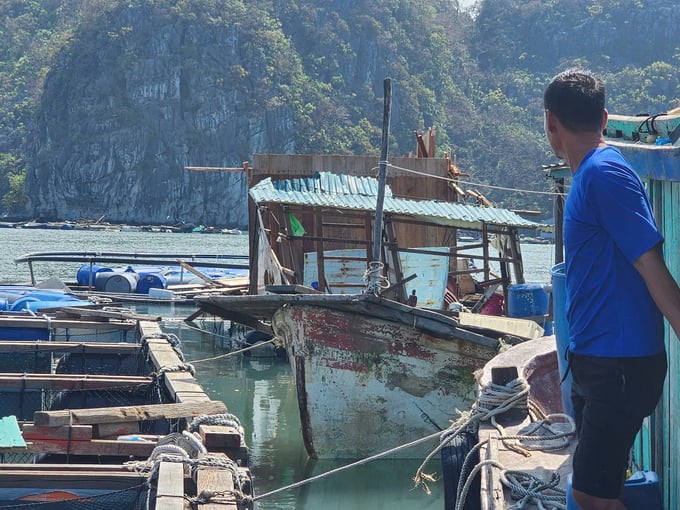
Mr. Tran Van Chuong's fish cages were swept away by the storm, leaving only a ruined fish hut. Photo: Vu Cuong.
The sea cultivators in Quang Ninh have suffered an immense amount of loss; however, their outlook remains optimistic.
For example, Ms. Vinh of Thang Loi Island (Van Don District) and her neighbor, Mr. Thanh, both suffered losses of nearly 5 billion VND and 10 billion VND, respectively. Nevertheless, they persist in their efforts. Ms. Vinh and numerous other sea farmers are resolute in their efforts to reestablish their livelihoods, regardless of whether they are successful or not. Mr. Thanh expressed a sentiment that was truly inspiring: "We will never surrender."
In the same a similar direction, Mr. Tran Van Thien assured the provincial chairman of Quang Ninh that "we will continue to guard the sea as long as we have life and health."
Van Don's sea farmers made it clear during a meeting with Quang Ninh province leaders and bank representatives that they were determined to "stand up where they fell." Numerous individuals anticipated that they would reestablish their lives and transform Van Don into a prosperous region within a mere two years. However, in order to experience a significant increase, aquaculture households require a "lifebuoy."
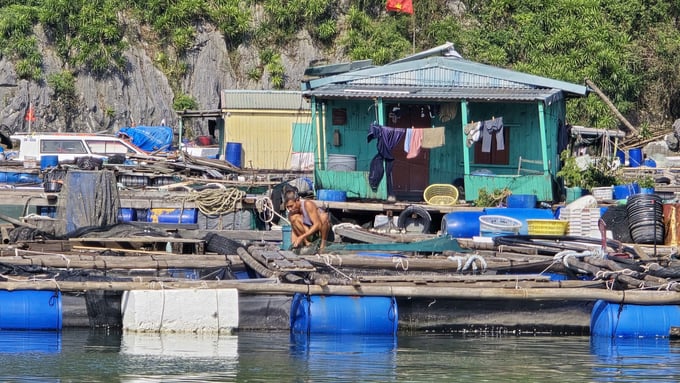
Marine farmers on Ong Cu Island (Cam Pha City) reinforce their cages after the storm. Photo: Vo Viet.
Banks must freeze debts and offer new loans at the lowest possible interest rates to facilitate production recovery. Additionally, they must postpone, defer, or reduce taxation on cooperatives' sea lease areas.
Cao Tuong Huy, Chairman of the Quang Ninh People's Committee, conveyed his concern for the sea farmers' losses during Typhoon No. 3. In response to Typhoon No. 3, Mr. Huy stated that the province would shortly investigate and implement policies and mechanisms to assist businesses and citizens.
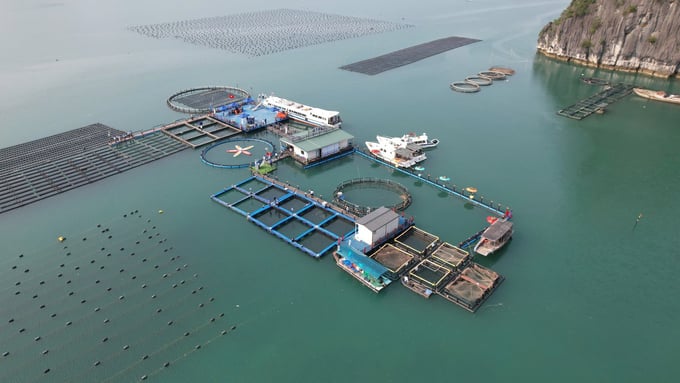
If supported with loans, sea farmers are determined to get back by double and triple as much. Photo: Nguyen Thanh.
In order to facilitate the swift implementation of policies, it is essential that the local authorities conduct a prompt evaluation and assessment of the damage to aquaculture facilities and households to ensure objectivity, honesty, transparency, and openness.
Cao Tuong Huy sent a letter to banks on September 18 to request assistance for creditors affected by Typhoon No. 3, as per his previous statements.
Mr. Huy suggested specific policies and mechanisms in his letter to alleviate the challenges faced by customers. These included the freezing of obligations, the reduction of loan interest rates, the provision of new loans to customers without collateral, and the provision of new loans with appropriate interest rates.
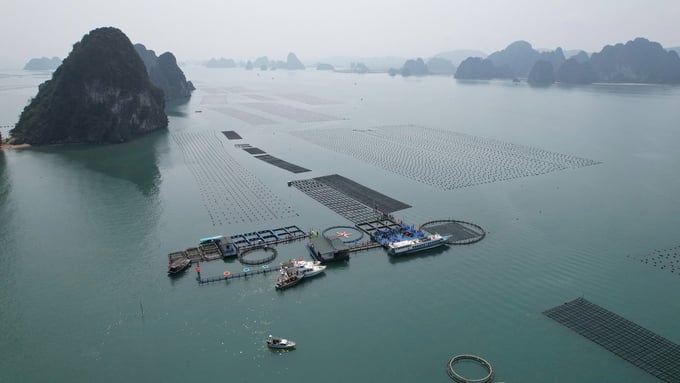
Van Don Sea "before the storm. Photo: Nguyen Thanh.
In accordance with the Prime Minister's directive in Resolution No. 143, the leadership of Quang Ninh aspires to collaborate directly with the heads of banks to address the challenges encountered by borrowers via discussions regarding potential solutions.
Five commercial banks—Agribank, Vietcombank, BIDV, Vietinbank, and BVBank—implemented support policies on September 19, just one day later. These policies included the following: adjusting interest rates by 0.5-2% per year, waiving 100% of overdue interest and late payment interest, reducing loan interest rates, and providing interest rate support for new borrowers, particularly short-term loans, to restore production and business activities. The support was effective starting from September 6. Typhoon No. 3 has precipitated the implementation of this assistance initiative in provinces and municipalities throughout the nation.
BIDV also issued a 200 trillion VND credit package to assist individual customers in borrowing to recover from the storm's impact. This package includes short, medium, and long-term loans at preferential interest rates compared to regular loans.
At present, the Quang Ninh branch of the State Bank of Vietnam is in the process of updating and compiling reports on customer losses for the State Bank. These reports will be used to issue directives to commercial banks, including joint-stock commercial banks, on how to reduce loan interest rates for existing customers who have been impacted. Furthermore, a credit program will be implemented to provide new loans at attractive interest rates, as well as unsecured loans for existing customers who have experienced losses as a result of the hurricane. This will enable them to reestablish their production and business operations.
Typhoon No. 3 severely impacted the aquaculture sector of Quang Ninh, as stated by Phan Thanh Nghi, the Deputy Director of the Department of Agriculture and Rural Development. According to damage assessments, the department has examined regulations and recommended that the provincial government offer partial financial assistance to the farmers.
Nevertheless, Mr. Nghi observed that, particularly in the context of sea farming, aquaculture investments are substantial. The state's support is relatively modest, resulting in a limited amount of assistance. Consequently, farm owners are forced to rely significantly on their own resources to address the current challenges.
Mr. Nghi candidly acknowledged that aquaculture, particularly sea farming, poses substantial risks in light of Typhoon No. 3 and previous incidents. The agricultural sector of the province will provide guidance to localities, organizations, and individuals with farming interests in order to ensure the efficiency of farming by modernizing their facilities, utilizing environmentally sustainable materials as outlined in Quang Ninh's regulations, and implementing scientific and technological processes. This will include the development of sustainable aquaculture, including sea farming.
Additionally, insurance is a critical factor to evaluate in the context of aquaculture. Mr. Phan Thanh Nghi stated that the department would collaborate with insurance companies to create insurance products for farmers in the future.
Translated by Linh Linh

(VAN) As a doctoral student doing research on renewable energy and electrification at Harvard University, the author shares his musings on electricity, nature, and countryside memories.

(VAN) The decree on Extended Producer Responsibility (EPR) ensures transparent management and disbursement of support funds, avoiding the creation of a “give-and-take” mechanism.

(VAN) Hue City rigorously enforces regulations regarding marine fishing and resource exploitation, with a particular emphasis on the monitoring of fishing vessels to prevent illegal, unreported, and unregulated (IUU) fishing.

(VAN) Hanoi People's Committee has issued a plan on reducing greenhouse gas emissions in the waste management sector with 2030 vision.

(VAN) Vietnam's draft amendment to Decree No. 156 proposes a mechanism for medicinal herb farming under forest canopies, linking economic development to population retention and the sustainable protection and development of forests.

(VAN) In reality, many craft village models combined with tourism in Son La have proven effective, bringing significant economic benefits to rural communities.

(VAN) The international conference titled Carbon Market: International experiences and recommendations for Vietnam was successfully held recently in Ho Chi Minh City.